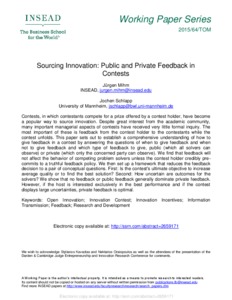|
Sourcing innovation: Public and private feedback in contests
Mihm, Jürgen
;
Schlapp, Jochen
![[img]](https://madoc.bib.uni-mannheim.de/40971/1.hassmallThumbnailVersion/JM%2BJS%20SSRN-id2659171%20Insead%202015.pdf)  Vorschau |
|
PDF
JM+JS SSRN-id2659171 Insead 2015.pdf
- Veröffentlichte Version
Download (1MB)
|
|
URL:
|
https://ub-madoc.bib.uni-mannheim.de/40971
|
|
Weitere URL:
|
http://ssrn.com/abstract=2659171
|
|
URN:
|
urn:nbn:de:bsz:180-madoc-409718
|
|
Dokumenttyp:
|
Arbeitspapier
|
|
Erscheinungsjahr:
|
2015
|
|
Titel einer Zeitschrift oder einer Reihe:
|
INSEAD Working Paper Series
|
|
Band/Volume:
|
64/TOM
|
|
Ort der Veröffentlichung:
|
Fontainebleau INSEAD
|
|
Sprache der Veröffentlichung:
|
Englisch
|
|
Einrichtung:
|
Fakultät für Betriebswirtschaftslehre > ABWL u. Logistik (Fleischmann 2009-)
|
|
Fachgebiet:
|
330 Wirtschaft
|
|
Freie Schlagwörter (Englisch):
|
Open Innovation , Innovation Contest , Innovation Incentives , Information Transmission , Feedback , Research and Development
|
|
Abstract:
|
Contests, in which contestants compete for a prize offered by a contest holder, have become a popular way to source innovation. Despite great interest from the academic community, many important managerial aspects of contests have received very little formal inquiry. The most important of these is feedback from the contest holder to the contestants while the contest unfolds. This paper sets out to establish a comprehensive understanding of how to give feedback in a contest by answering the questions of when to give feedback and when not to give feedback and which type of feedback to give, public (which all solvers can observe) or private (which only the concerned party can observe). We find that feedback will not affect the behavior of competing problem solvers unless the contest holder credibly precommits to a truthful feedback policy. We then set up a framework that reduces the feedback decision to a pair of conceptual questions. First: Is the contest's ultimate objective to increase average quality or to find the best solution? Second: How uncertain are outcomes for the solvers? We show that no feedback or public feedback generally dominate private feedback. However, if the host is interested exclusively in the best performance and if the contest displays large uncertainties, private feedback is optimal.
|
 | Dieser Eintrag ist Teil der Universitätsbibliographie. |
 | Das Dokument wird vom Publikationsserver der Universitätsbibliothek Mannheim bereitgestellt. |
 Suche Autoren in Suche Autoren in
Sie haben einen Fehler gefunden? Teilen Sie uns Ihren Korrekturwunsch bitte hier mit: E-Mail
Actions (login required)
 |
Eintrag anzeigen |
|
|
 ORCID: 0000-0003-2443-9272
ORCID: 0000-0003-2443-9272



 Suche Autoren in
Suche Autoren in